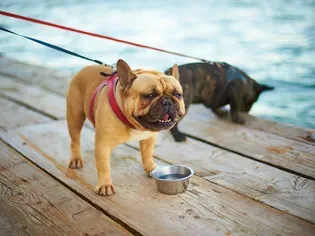Signs and Causes of Puppy Dehydration
Updated on 04/26/24

Signs and Causes of Puppy Dehydration: A Comprehensive Guide for Pet Owners
Puppies are adorable and energetic creatures, but they are also vulnerable to dehydration, a condition that can quickly become life-threatening if left untreated. Recognizing the signs and understanding the causes of puppy dehydration is crucial for pet owners to ensure their furry friends' well-being.
Signs of Puppy Dehydration
The following signs may indicate that your puppy is dehydrated:
1. Dry Nose and Mouth: A puppy's nose and mouth should be moist and cool to the touch. Dryness indicates a loss of moisture.
2. Lethargy and Decreased Activity: Dehydrated puppies may appear lethargic, lacking their usual energy and enthusiasm.
3. Loss of Skin Elasticity: Gently pinch the skin on the back of your puppy's neck. In a hydrated puppy, the skin should snap back into place quickly. Dehydration can cause the skin to remain tented, indicating a loss of subcutaneous fluids.
4. Sunken Eyes: Dehydrated puppies may have sunken or appearing eyes due to the loss of fluids in the surrounding tissues.
5. Dark or Concentrated Urine: Normal puppy urine is clear or light yellow. Dark or concentrated urine suggests that the puppy is not consuming enough fluids.
6. Fast Capillary Refill Time: Press down on your puppy's gums and release. The gums should return to their normal pink color within 1-2 seconds. A slow capillary refill time indicates dehydration.
7. Increased Respiratory Rate: Dehydrated puppies may breathe faster than usual to compensate for the loss of fluids.
8. Vomiting and Diarrhea: Excessive vomiting and diarrhea can lead to rapid dehydration in puppies.
Causes of Puppy Dehydration
Several factors can contribute to puppy dehydration:
1. Diarrhea and Vomiting: These conditions result in the loss of fluids and electrolytes, leading to dehydration.
2. Excessive Exercise or Heat: Puppies may become dehydrated if they exercise too vigorously or are exposed to high temperatures for extended periods.
3. Insufficient Water Intake: Puppies, especially young ones, may not drink enough water on their own, particularly if they are nursing.
4. Certain Medical Conditions: Underlying medical conditions, such as kidney or liver disease, can cause excessive fluid loss and dehydration.
5. Improper Feeding: Feeding puppies a low-quality diet or limiting their access to fresh water can contribute to dehydration.
Treatment of Puppy Dehydration
If you suspect your puppy is dehydrated, seek immediate veterinary care. Treatment involves rehydrating your puppy through IV fluids, oral electrolytes, or subcutaneous fluids.
Prevention of Puppy Dehydration
Preventing puppy dehydration is essential for maintaining their health:
1. Provide Fresh Water at All Times: Make sure your puppy has access to clean, fresh water 24/7.
2. Monitor Water Intake: Pay attention to how much water your puppy drinks and offer frequent opportunities to hydrate.
3. Avoid Excessive Heat and Exercise: Limit your puppy's exposure to high temperatures and avoid vigorous exercise during hot weather.
4. Feed a Nutritious Diet: Provide your puppy with a balanced diet that meets their nutritional needs.
5. Seek Regular Veterinary Care: Schedule regular veterinary check-ups to monitor your puppy's health and address any potential dehydration concerns.
Conclusion
Puppy dehydration is a serious condition that can have life-threatening consequences if left untreated. By recognizing the signs, understanding the causes, and implementing preventive measures, pet owners can ensure the well-being of their beloved furry companions. If you suspect your puppy is dehydrated, seek veterinary attention promptly to avoid potential complications.
Explore More Pets

Basic Training
Puppy and Baby Introductions

Working Dog Breeds
All About Search and Rescue Dogs

Dog Treatments
Puppy Vaginitis: Signs, Causes and Treatment

Dog Adoption
After More Than 1,200 Days in the Shelter, Coco Goes Home

Basic Training
How to Train Your Puppy to Go on Potty Pads

Hybrid Dog Breeds
The Difference Between a Mutt, Mixed Breed, or Designer Dog?

Dog Treatments
Nail Problems in Dogs

Puppies
7 Reasons Why Two Dogs Are Better Than One